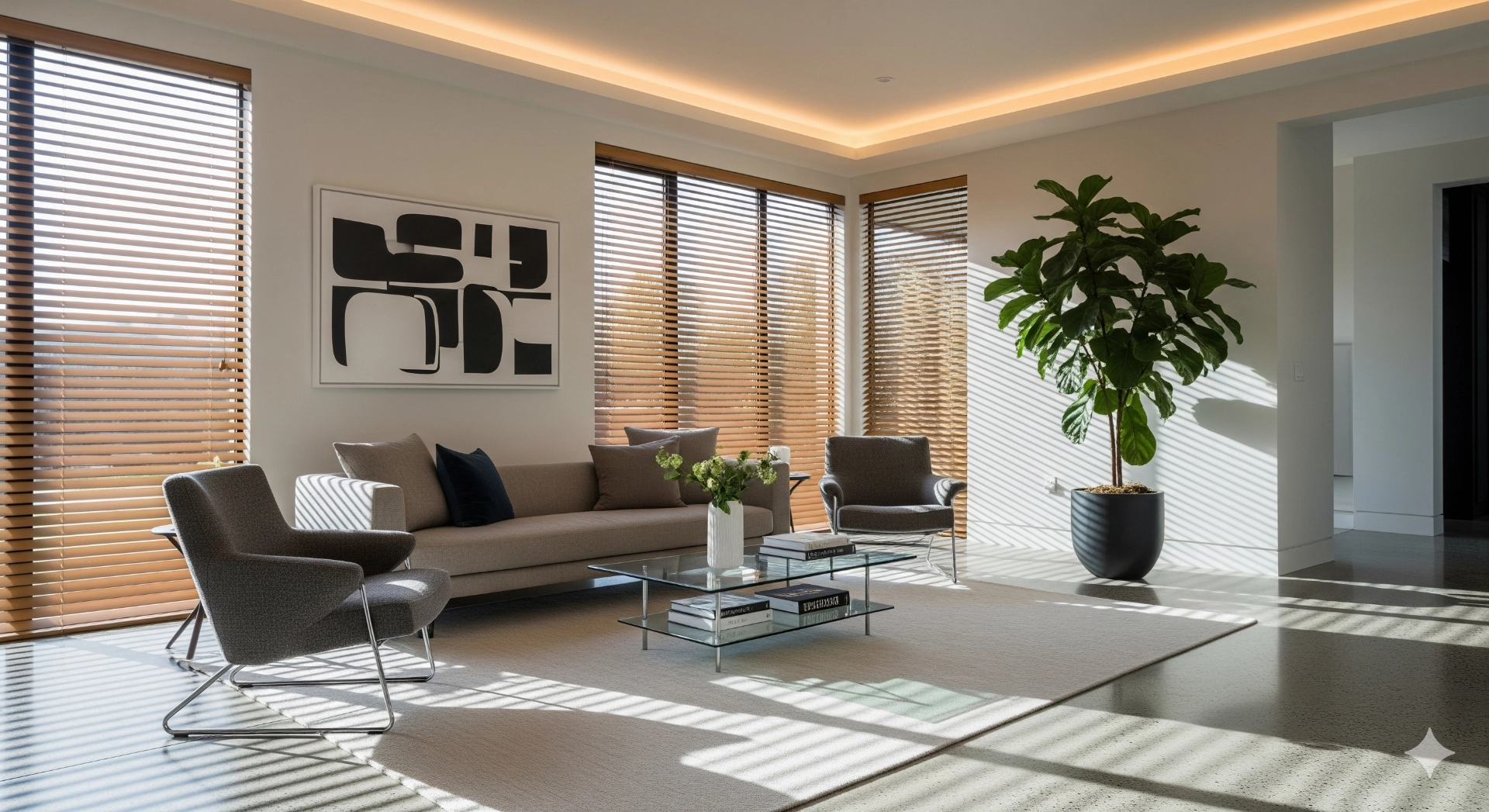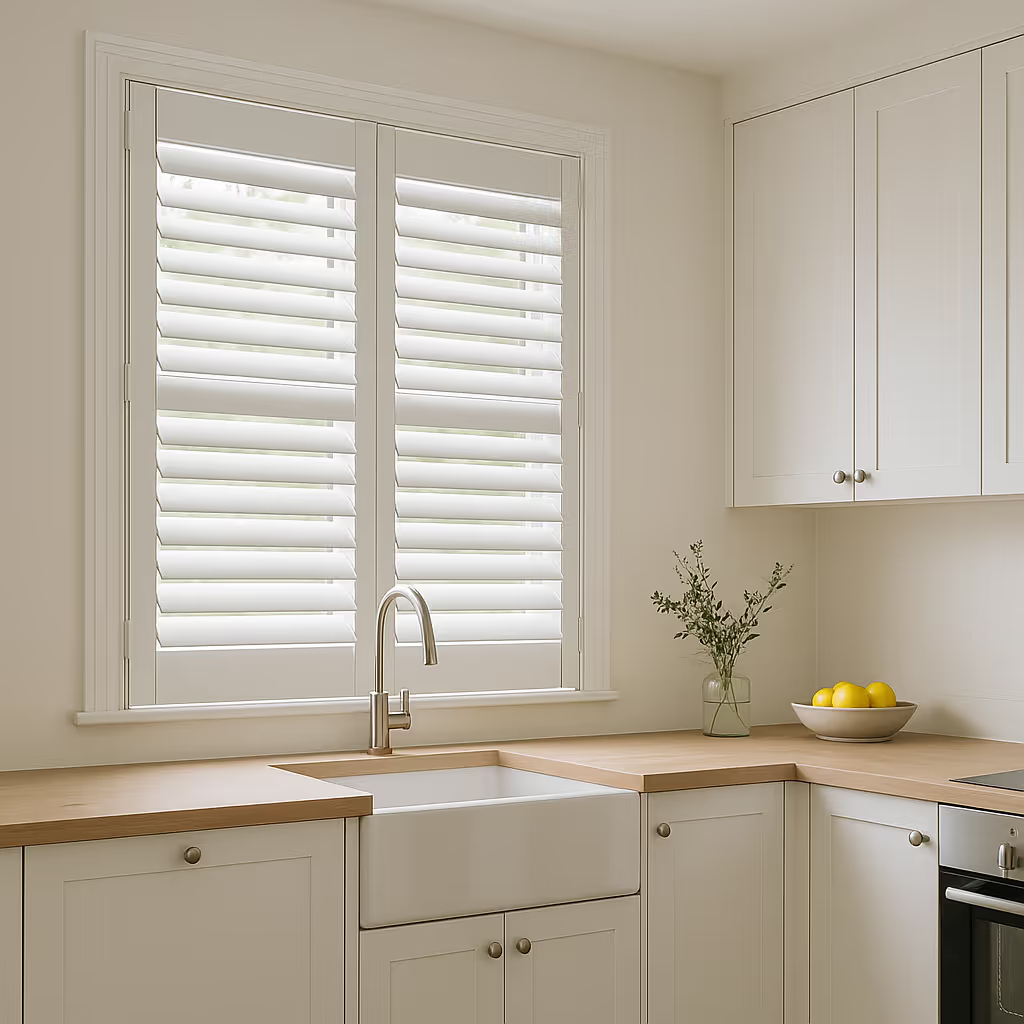Custom Shutters vs Traditional Blinds: A Bay of Plenty Homeowner's Guide

When it comes to window treatments for your Bay of Plenty home, the decision between plantation shutters and traditional blinds represents more than just style preference. It's an investment decision that affects your home's value, energy efficiency, and daily living experience. At Western Bay Blinds, we help homeowners across Tauranga, Katikati, and surrounding areas make this important choice with confidence.
Understanding Your Options
Plantation shutters are fixed louvred panels that become a permanent part of your window architecture, offering adjustable light control through moveable slats within a solid frame. Traditional blinds, on the other hand, encompass flexible window coverings including venetian blinds, roller blinds, roman blinds, and cellular blinds that can be easily adjusted, removed, or replaced as your needs change.
The choice between these two options depends on several factors that matter most to Bay of Plenty homeowners, from initial investment and long-term value to daily functionality and aesthetic appeal.
Style and Aesthetic Impact
Plantation shutters create clean, architectural lines that become part of your home's permanent structure. They add significant kerb appeal and character while suiting both traditional villa-style homes and contemporary Bay of Plenty architecture. The luxury, high-end appearance they provide is particularly valued in the premium property market across Tauranga and coastal areas.
Available in various slat sizes ranging from 63mm to 114mm, plantation shutters offer multiple paint and stain options to complement your home's colour scheme. They can be custom-shaped for arched or unusual windows and can be mounted inside or outside the window frame depending on your architectural requirements. This versatility makes them particularly suitable for Bay of Plenty homes, where they complement the indoor-outdoor living style popular in our region while framing beautiful coastal and rural views.
Traditional blinds offer unlimited style options from minimalist to decorative, allowing you to easily change your room's appearance without major renovation. The variety is impressive, with hundreds of colour, pattern, and texture options available across different blind types. Multiple operation styles including cord, cordless, and motorised systems provide flexibility, while various mounting options accommodate different window types.
Traditional blinds adapt particularly well to the relaxed coastal lifestyle, offering flexibility for homes that evolve with changing needs and seasonal decorating preferences. They're ideal for homeowners who enjoy updating their interior design regularly or those who prefer not to make permanent architectural changes.
Cost Analysis: Investment vs Expense
The initial investment difference between plantation shutters and traditional blinds is substantial. Plantation shutters typically cost between $800 and $1,500 per square metre, depending on material choices and features. For a typical Bay of Plenty home with 10 windows, this translates to an investment of $12,000 to $25,000. This represents a premium investment with long-term value returns.
Traditional blinds offer a lower initial investment, ranging from $150 to $800 per window depending on type and size. The same 10-window home would require an investment of $2,000 to $8,000, making them more accessible for budget-conscious homeowners or those preferring to spread costs over time.
However, the long-term value analysis reveals a more complex picture. Plantation shutters boast a 15 to 25-year lifespan with no replacement costs during the typical ownership period. They require minimal maintenance and typically add 2% to 5% to property value while providing energy savings through superior insulation.
Traditional blinds generally last 5 to 10 years before requiring replacement, resulting in ongoing costs throughout homeownership. They require regular maintenance and cleaning, have limited impact on property value, and provide variable energy efficiency benefits depending on the type chosen.
A real-world example illustrates this difference: a Tauranga homeowner choosing shutters at $18,000 versus blinds at $5,000 initially saves money with blinds, but replacing them twice over 15 years costs $10,000 total. The homeowner actually saves $2,000 while gaining superior performance and property value increase with shutters.
Energy Efficiency and Climate Performance
Plantation shutters excel in thermal performance with an R-value of approximately 2.0 to 3.0, providing excellent insulation. When closed, they create minimal air gaps, forming an excellent thermal barrier. Their superior wind resistance makes them particularly valuable in Bay of Plenty coastal conditions, while their year-round comfort benefits make them ideal for New Zealand's variable climate.
Traditional blinds offer variable energy performance depending on type. Honeycomb blinds achieve R-values of 1.5 to 2.5, providing very good insulation. Venetian blinds offer moderate performance with R-values of 0.5 to 1.0, while roller blinds range from 0.3 to 1.0 depending on thermal backing options.
For coastal exposure areas like Tauranga and Waihi Beach, plantation shutters provide superior wind resistance and salt air tolerance, while some blind fabrics may fade or deteriorate faster in harsh coastal conditions. In inland areas like Matamata and Paeroa, shutters offer excellent frost protection and thermal mass benefits, though more affordable thermal options like honeycomb blinds can provide good performance for budget-conscious homeowners.
Durability and Maintenance
Plantation shutters are built to last, constructed from solid timber or composite materials with professional-grade hardware and hinges. They demonstrate excellent resistance to warping and fading while providing superior performance in New Zealand's UV-intense environment. Their maintenance requirements are minimal, requiring only annual inspection and hardware adjustment, bi-annual cleaning with a damp cloth, and occasional touch-up painting every 8 to 10 years.
Traditional blinds offer variable longevity depending on type and quality. Aluminium venetians typically last 8 to 12 years with good care, while timber venetians last 6 to 10 years depending on conditions. Roller blinds generally provide 5 to 8 years of service with regular use, and roman blinds last 5 to 7 years with proper cleaning. However, they require more frequent maintenance including regular dusting and cleaning, mechanism lubrication, cord replacement, and fabric cleaning or replacement as needed.
Functionality and Daily Use
When it comes to light control precision, plantation shutters offer infinite positioning of louvres, providing excellent graduated control and superior privacy with minimal light loss. Their operation is purely mechanical, requiring no cords or complex mechanisms that might break over time.
Traditional venetian blinds also provide excellent precise light control, while roller and roman blinds offer good but limited up-and-down positioning. Honeycomb blinds provide good light filtering with variable opacity options. Operation varies significantly by mechanism type, from traditional cord systems to modern cordless and motorised options.
Plantation shutters are remarkably easy to operate, requiring simple louvre adjustment by hand with no cords or mechanisms to break. They're suitable for all ages and abilities and maintain consistent operation over decades. Traditional blinds vary in ease of use, with cord operation being traditional but requiring regular maintenance, cordless options being safer but potentially harder for some users, and motorised systems offering the most convenience while requiring power and ongoing maintenance.
Safety Considerations
For families with children and pets, plantation shutters provide excellent safety features with no cords or hanging components. Their large, easy-to-use tilt rods are safe to operate, while their durable construction resists damage from children and pets. Being permanently mounted, there's no risk of them falling.
Traditional blinds offer variable safety depending on cord and cordless options chosen. Modern solutions including cordless and motorised options address safety concerns, but they require regular inspection of safety features and professional installation to ensure compliance with New Zealand safety standards.
Property Value Impact
Plantation shutters typically add 2% to 5% to property value and are highly appealing to potential buyers. They're considered premium architectural features representing long-term investment with lasting appeal. In the Bay of Plenty market, buyers increasingly value quality fixtures, and shutters appeal to both local buyers and Auckland purchasers seeking lifestyle properties, providing excellent return on investment when selling.
Traditional blinds are generally considered maintenance items rather than improvements. While quality blinds are expected by buyers, they don't add significant value to property. They may need replacement before sale for maximum appeal, though they offer a budget-friendly way to refresh home appearance for selling.
Environmental Impact
From a sustainability perspective, plantation shutters offer significant advantages through their 15 to 25-year lifespan, which reduces replacement waste. Sustainable timber options are available, and their energy efficiency reduces ongoing heating and cooling energy use while supporting local New Zealand timber industry.
Traditional blinds have shorter lifespans requiring more frequent replacement, creating additional waste. However, some options now feature recycled materials and eco-friendly manufacturing processes. The choice often comes down to balancing initial environmental impact against longevity and ongoing replacement needs.
Making the Right Choice for Your Bay of Plenty Home
The decision between plantation shutters and traditional blinds ultimately depends on your priorities, budget, and long-term plans. Plantation shutters represent a premium investment ideal for homeowners planning to stay long-term, those prioritising energy efficiency, or anyone seeking maximum property value enhancement.
Traditional blinds suit homeowners preferring flexibility, those with budget constraints, or anyone who enjoys regularly updating their interior design. They're also ideal for rental properties or homes where permanent architectural changes aren't desired.
At Western Bay Blinds, we help you evaluate these factors during our free in-home consultation, considering your home's specific architecture, orientation, and your family's lifestyle needs. We'll provide detailed cost comparisons and help you understand the long-term implications of each choice.
Professional Advice Makes the Difference
Whether you choose plantation shutters or traditional blinds, professional consultation, measurement, and installation ensure optimal performance and longevity. Our experience with Bay of Plenty homes means we understand local climate challenges and can recommend the best solution for your specific situation.
Contact Western Bay Blinds today for your free consultation. We'll assess your windows, discuss your priorities, and help you make the choice that best serves your home, family, and budget for years to come.

The future of home automation has arrived in the Bay of Plenty, and it's transforming how we interact with our living spaces. Motorised blinds represent one of the most practical and impressive smart home upgrades available to Tauranga, Katikati, and Matamata homeowners.
Not all blinds are created equal, and what works beautifully in your living room might be completely wrong for your bathroom. At Western Bay Blinds, we help Bay of Plenty homeowners navigate the unique requirements of each space
As energy costs continue to rise across New Zealand, savvy homeowners in the Bay of Plenty are discovering that the right window treatments can dramatically reduce heating and cooling expenses.
The world of window treatments is evolving rapidly, and 2025 is shaping up to be an exciting year for Bay of Plenty homeowners looking to refresh their spaces.
